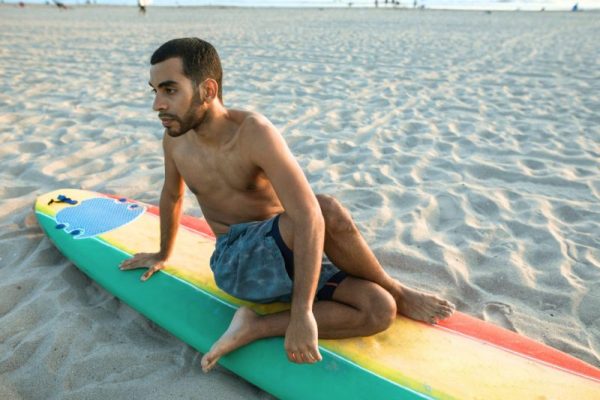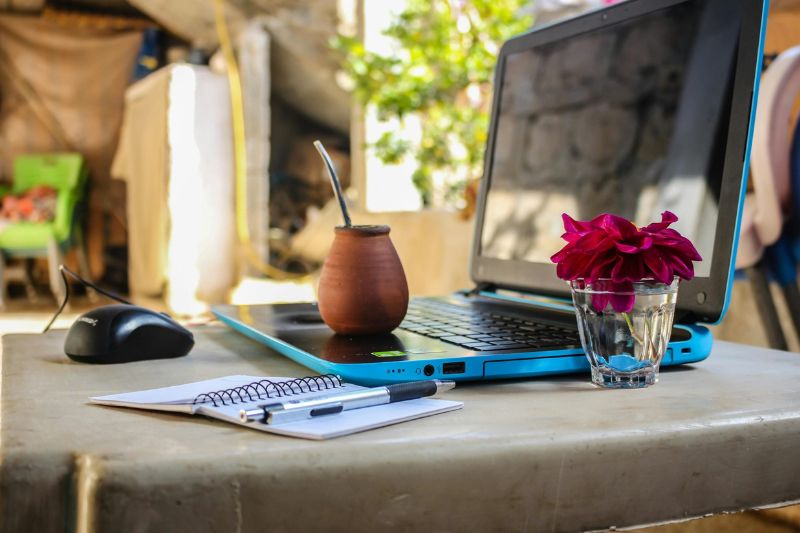Sun, sea, and surf – the three key ingredients to living your best life as a digital nomad surfer. And for the most part, these factors are the recipe for keeping your mental health in top form while you are away from home.
However, just like any other lifestyle there will always be ups and downs, and occasionally on down days, you might even find yourself wondering whether you made the right decision when you packed up your things and committed to stepping out of your comfort zone to follow your passions while working remotely.
It is completely normal to face both physical and mental challenges, whether you’re homesick, injured or maybe the digital nomad lifestyle isn’t living up to your expectations.
Even though negative thoughts do happen, it’s important not to let them derail your experience. In this article, we will run through why self-care is extremely important, how to improve your emotional well-being and discuss some unique considerations tailored to surfers.
The challenges of being a digital nomad
It’s a very common misconception that just because you’re travelling in a new and exciting country, you’re happy all the time. I remember calling my parents after my six-month stint in Southeast Asia complaining about burnout, for them to respond “Why? The weather’s so much nicer there than it is for us in the UK!”.
To others, the digital nomad lifestyle is idyllic and carefree (which is true 90% of the time), but in reality, there are a lot of ongoing factors that can affect your mental health.
For example, a study published in the International Journal of Health & Productivity found that expats had “a higher overall risk for mental health problems, including risk for internalizing problems, externalizing problems, and substance use disorders.”
This is because digital nomads are more exposed to feeling isolated and homesick, having issues with balancing and maintaining a routine, and exhaustion from constant travel.
Why self-care matters for digital nomads
In response to these challenges, self-care is an important – and often neglected – tool to ensure your routine incorporates rest, connection and personal reflection.
Taking the time to recharge and evaluate what you can improve is key to preventing burnout, loneliness, and negative impacts on your personal and professional life.
By prioritising self-care rituals, you can make sure you’re making the most of your chosen lifestyle and not have any regrets when you eventually return home (if you want to!).
Self-care tips to prioritise your well-being
Below, I’ve highlighted some practical tips and tricks to help you stay in touch with your mental, emotional, and physical well-being.
Staying connected
Without a stable support network, it’s easy to feel disconnected and lonely, especially when you see videos of friends on social media or miss your family.
In these instances, it’s crucial to remember friends and family are not going away, and they are easily contactable. One comforting tip I use is to schedule regular calls, for example, every Wednesday at four o’clock. Having a set time not only gives you a piece of home to look forward to during the week but also removes the hassle of decision-making and coordination each time, which can often feel overwhelming.
It’s also important to try and build your support network while you are travelling and putting yourself out there to meet like-minded people to share your experiences with – and remember, other people are in the same boat. If you’re struggling to organically make new friends, I strongly recommend trying Facebook community groups or Bumble BFF – both of which were key factors in improving my mental health when I relocated to New Zealand.
Keeping a personal routine

Everyone will have their surf routine and their professional routine. However, people tend to forget about their personal routine – taking time to do the things that make them feel good that may have forgotten about during their time abroad.
For example, maintaining a skincare routine, having a fixed sleep schedule or spending fifteen minutes a day writing in a journal. These things may seem small, but they serve as a reminder that you need to prioritise your own needs outside of the digital nomad surfer lifestyle.
Maintaining physical health
Physical health ties directly into improving your mental health, for example, if you’re ill then that feeds into missing home and time away from friends and the waves.
Although it’s inevitable that you’ll get sick during your travels, there are things you can do to stay fit and healthy. For example, while I’ve been living in a van I’ve found it harder to cook nutritious, substantial meals (mainly due to the amount of effort it takes in a smaller space!). However, I’ve learned to adapt by preparing simple, balanced meals that require minimal equipment and time, alongside bulk buying healthy snacks such as nuts, granola bars, and fruit.
Additionally, it’s beneficial to explore additional sports or hobbies outside of surfing to mix up your routine and work out different muscle groups. Activities such as yoga and Pilates are great for active recovery, encouraging stretching and giving you time for meditation.
The power of technology
The beauty of the 21st century is that there are loads of apps, resources and videos to help you with a variety of health and wellness needs. Whether it’s fitness apps that guide you through quick workouts, meal planning tools that offer quick and easy recipes, or mindfulness apps to help you manage stress, technology makes it easier than ever to maintain a balanced lifestyle while on the move.
For me, I struggled to process my thoughts and feelings about different aspects of travelling, so I downloaded an app called Finch – which I couldn’t recommend more. It’s essentially a Tamagotchi-style virtual pet which grows as you record your thoughts and take part in different reflection exercises.
Not only does it encourage me to check in with myself regularly, but it also helps me prioritise mental health by making the process fun and interactive.
Destination evaluation
It’s incredibly common to arrive in a new place and something just doesn’t feel right. Whether the surf conditions aren’t up to your expectations or a lack of social opportunities, being in the right destination that aligns with your needs is crucial to maintaining your emotional well-being.
My advice on this point is very simple: remember, you are never stuck somewhere forever. This may sound silly, but sometimes when we don’t get a good feeling about somewhere we start to panic and feel like we can’t leave – but this isn’t the case.
If a location isn’t fulfilling your needs, it’s completely okay to move on and explore somewhere else. Your well-being should always be a priority, and one of the many benefits of remote work is there’s always another destination that might be a better fit for what you’re looking for.
Unique considerations for surfers
For surfers, there are different factors to consider when maintaining your physical and mental health. Beyond the usual travel factors such as weather and surf conditions, a couple of key considerations are below.
Avoiding injury and sunburn
When you’re out on the waves, it can be easy to forget about safety. However, sustaining unnecessary injuries means taking time to recover and spending less time doing what you enjoy.

Simple steps such as choosing the right gear and stretching before a session will help you to continue exploring your passion for surfing. And not to sound like my Mum, the same thing applies to getting burnt.
Before jumping on a board, it’s important to thoroughly apply water-resistant, SPF 30+ sun cream to all visible areas – otherwise, you’ll wake up incredibly sore the next day!
Knowing your skill level
I would argue this is one of the most important considerations as a digital nomad surfer, as understanding your skill level is key to avoiding injury or knocking your confidence.
Firstly, consider this when choosing your destination, whether you’re a beginner looking for gentle waves or an experienced surfer wanting challenging breaks, this decision will significantly impact how much you get out of your time in the water.
At the same time, it is beneficial to push yourself slightly out of your comfort zone to try new techniques and challenge yourself, but you don’t want to put yourself in danger. Overall, it’s important to be realistic about your abilities and be patient with the learning process.
Conclusion
It’s easy to neglect your mental and physical health during your time as a digital nomad surfer. However, by following some of the tips and tricks in this article, you can create a routine that makes your well-being a top priority, while still enjoying the freedom this lifestyle offers.
For more advice on how to live the digital nomad surfer lifestyle, read our other articles and check out our Instagram page.



